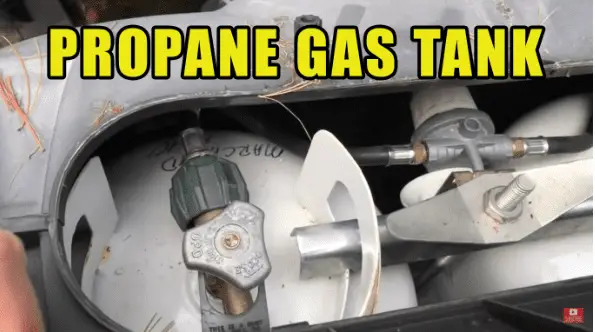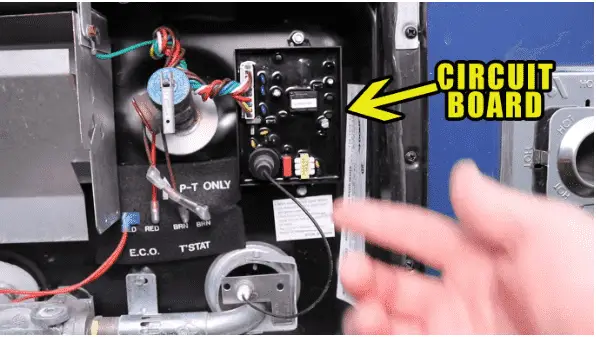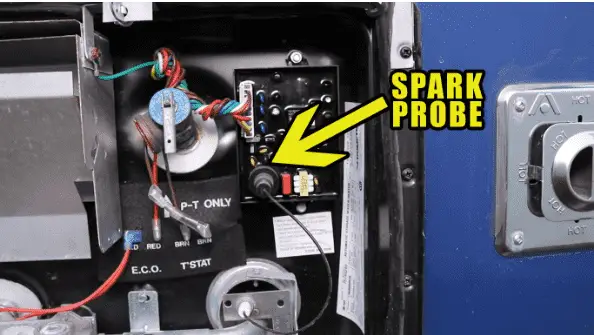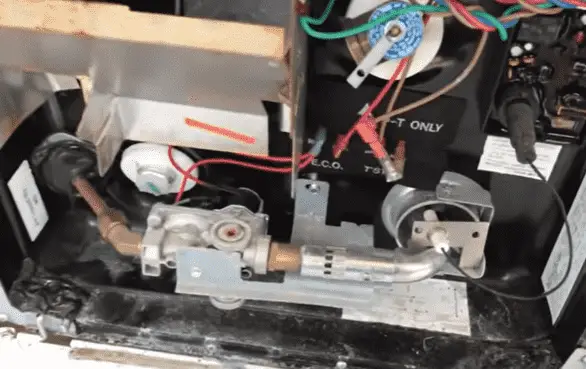The most common reasons behind an RV water heater igniter not clicking are wrong valve selection, blown fuse, damaged earth wire, faulty thermal cutoff, damaged circuit board, dirty connectors, and a faulty spark probe.
Keep reading this RV hot water troubleshooting guide to learn more about each of these problems and find out the solution to each of these problems.
Table Of Contents
- RV Water Heater Igniter Not Clicking [7 Easy Fixes]
- 1. Wrong Valve Selection
- 2. Blown Fuse
- 3. Damaged Earth Wire
- 4. Faulty Thermal Cutoff
- 5. Damaged Circuit Board
- 6. Dirty Connectors
- 7. Faulty Spark Probe
- FAQs:
- Why is my RV hot water heater sparking but not lighting?
- Why does my water heater keep clicking?
- Why is the RV water heater igniter not staying lit?
- How long does a water heater igniter last?
- Conclusion
RV Water Heater Igniter Not Clicking [7 Easy Fixes]
Don’t know how to test RV hot water heater igniter? We got you covered. Follow this guide step by step to determine the problem with your RV water heater.
1. Wrong Valve Selection
Most newer models of the RV water heater have two tanks for propane. There’s a selector valve that allows you to choose which tank you want the propane to come from. You can choose any one of the two tanks or both of them.

The RV water heater won’t ignite if you select the wrong tank. The tank you choose needs to have enough propane gas for the heater to work. If the tank that you select is empty, then the indicator will be red.
Solution:
There are two things you need to do:
- Fill the tank you want to use with propane.
- Ensure that the selector valve selects that tank.
The indicator will be green to ensure that you’ve sufficient propane and you’ve selected the right tank.
Should you take propane from one tank or both tanks? As a general rule, it’s good to get the propane supply from just one tank.
If you take propane from both tanks, both of them can run out at quick intervals and the heater won’t work anymore.
But if you use one tank at a time, you’ll know which tank has run out of propane. You can use the other tank and refill the used one before the propane empties out in the second one.
If you do this switcheroo technique, you would never run out of propane gas and hot water from your RV heater.
2. Blown Fuse
The RV water heater needs power for it to ignite and start the flame. But if the fuse is blown, it won’t be able to do so. If more electricity passes the fuse than what it’s meant to handle, it’ll blow up.
Inspecting a blown fuse is an easy job. To check the fuse breakers, you need to locate the breaker panel. Make sure first that all the breakers are on and reset the breakers if any one of them is off.
If the fuse is not in good condition and looks burned or corroded, that means it’s gone bad.
Solution:
Since fuses are made for one-time use only, you’ll need to replace them when they are burned. Replace the blown fuse with a new one and your RV water heater should be up and running again if it was the issue.
3. Damaged Earth Wire
There’s a brown wire by the fuse which makes sure the necessary electricity flows to the heater and the extra electric current goes to the ground. This wire protects the wire from any short circuit.
But everything is subject to wear and tear and these wires are no expectation. You can inspect the condition of the wire by using a voltmeter. If current passes through the wire, that means it’s fine. Otherwise, it’s damaged.
Solution:
The earth wire needs to be replaced if it’s damaged. Test your heater after replacing the wire. It should run fine if there are no other underlying issues behind it not igniting.
4. Faulty Thermal Cutoff
The thermal cutoff is a safety mechanism to protect the heater from reaching an unsafe temperature. It reacts to too much heat as opposed to too much electric current. You can check if it has power to it by using a voltmeter.
It’s a fuse for excessive heat. The thermal cutoff isn’t designed to reset itself like other circuit breakers. If the thermal cutoff is tripped, the heater won’t ignite.
Solution:
As a temporary solution in case of an emergency, you can remove the thermal cutoff and bypass it. Your heater will run. But remember that the thermal cutoff is there for a reason and it’s meant to protect your heater.
So, the ideal course of action would be to replace the damaged thermal cutoff with a new one. That will ensure the long-term protection of your RV water heater and yourself.
5. Damaged Circuit Board
The flow of power goes from the fuse to the earth wire to the thermal cutoff and then the circuit board. If all the preceding components are working, the problem could very well be with the circuit board.

Your good old friend – the voltmeter will once again come in handy to test if the circuit board is okay. There are different power outlets on the circuit board and you can check them with the voltmeter one by one.
Be on the lookout for the power outlet that connects with the spark probe. If the spark probe doesn’t get power, you’ll find the RV water heater igniter not working.
Solution:
You have to replace the faulty circuit board with a new one. They’re priced anywhere from $60 to $200. Once you replace the circuit board, reconnect the wires and your heater should work fine again.
6. Dirty Connectors
The presence of dirt in the connectors can also lead to the water heater not igniting. It’ll stop the power from passing to the control board. Pull the connectors from the circuit board and check if there’s any dirt in them.
Solution:
You’re in luck if the problem is dirty connectors as it’s an incredibly easy problem to fix. Take a rag, wipe the connectors to remove the dirt from the connectors and you’re good to go.
7. Faulty Spark Probe
If all the other things are okay, the last thing to check would be the spark probe. It needs the flow of power to create a spark and ignite the heater. It’s connected to the water heater spark igniter.

The spark probe is located at one of the outlets on the circuit board. Check the ends of the spark probe with a voltmeter and see if it’s getting no power.
Solution:
The faulty spark probe has to be replaced if it’s not getting power. You can get a new one and change it yourself. It’ll be an easy fix and your hot water heater will be back in action again.
FAQs:
Why is my RV hot water heater sparking but not lighting?
If you hear the heater sparking but it’s not lighting, that means it’s not getting gas. Make sure that you’ve enough propane and selected the correct propane tank to light the heater.
Why does my water heater keep clicking?
The clicking sound is often caused by the build-up of dirt and debris in the igniter or pressure changes in the heater. Clean the area around the igniter and see if that solves the issue.
Why is the RV water heater igniter not staying lit?
If your RV hot water lights up but shuts off after a few seconds, the issue is most likely caused by a faulty flame sensor. It’s not able to detect the heat and it shuts the whole system off.
How long does a water heater igniter last?
An RV water heater igniter lasts from 5 years to 7 years on average. It becomes dirty as time passes and needs to be replaced when it reaches that stage.
Conclusion
Now you know all the common reasons behind your RV water heater igniter not clicking and the steps you can take to solve these issues. Regular maintenance of your vehicle will prevent these issues.
We hope the tips we shared will help you get your RV heater operational again and enjoy a hot shower. Leave a comment below if you have any questions about RV water heaters.
Note: You can also read how to fix RV water heater lights then goes out problem.

